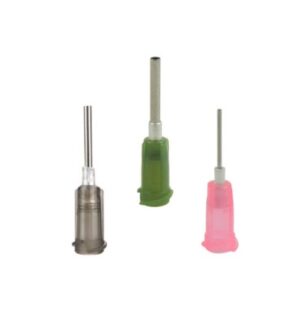
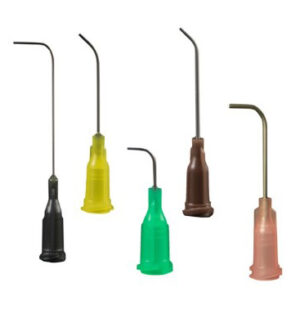
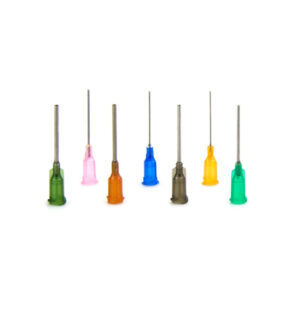
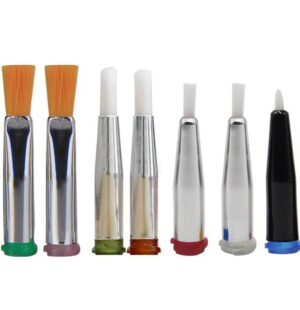
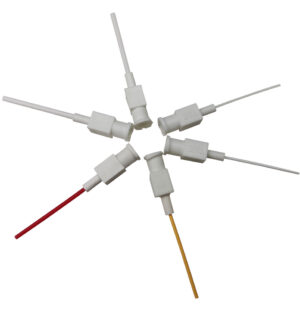
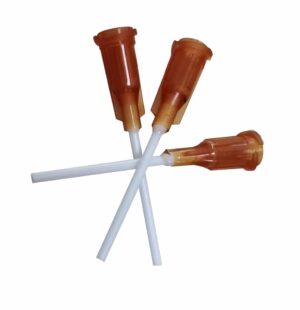
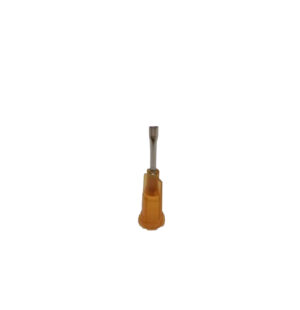
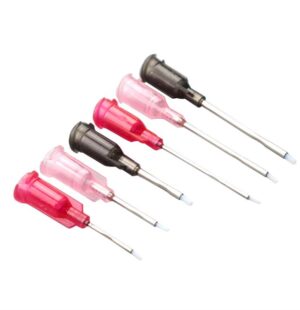
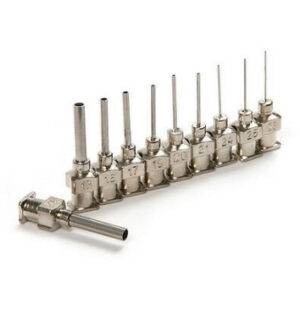
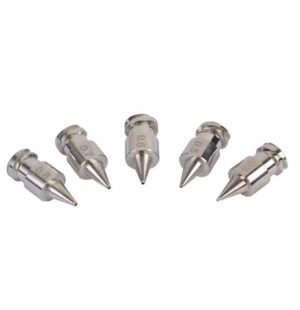
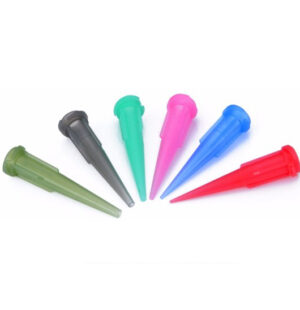
Here you can find various types of dispensing tips & needles for industrial and various adhesives. We offer you a wide range of dispensing tips in different gauge and materials – just right for your application. If there are special requirements, our team will help you find the solution you need. We have compiled the most important information for you below.
Dispensing tips are commonly used for applying a wide range of adhesives, sealants, and other fluids in various industries. The suitability of an adhesive for dispensing tips depends on several factors, including the adhesive’s viscosity, curing time, and chemical composition. Here are some common adhesives that are suitable for use with dispensing tips:
Cyanoacrylate Adhesives (CA or Super Glue): These fast-curing adhesives have low to medium viscosity and are often used with dispensing tips for precision bonding in electronics, woodworking, and other applications.
Epoxy Adhesives: Epoxies come in various viscosities, and many are suitable for dispensing through tips. They are used in applications where a strong bond is required, such as in construction, aerospace, and automotive.
UV-Curable Adhesives: These adhesives remain liquid until exposed to ultraviolet (UV) light, making them ideal for precise dispensing. They are commonly used in electronics, optics, and medical devices.
Anaerobic Adhesives: Anaerobic adhesives cure in the absence of oxygen and are often used with dispensing tips in automotive and industrial assembly applications, such as threadlocking and gasketing.
Silicone Adhesives and Sealants: These come in various viscosities and are used for sealing and bonding in construction, automotive, and electronics. Some silicone adhesives can be dispensed using appropriate tips.
Polyurethane Adhesives: Polyurethane adhesives vary in viscosity, and some can be dispensed using tips. They are used in construction, woodworking, and automotive applications.
Acrylic Adhesives: Acrylic adhesives are available in different formulations, some of which are suitable for dispensing through tips. They are used in various industries, including signage and aerospace.
Hot Melt Adhesives: Hot melt adhesives are heated and dispensed as a molten liquid. While they don’t use traditional dispensing tips, they are commonly used for bonding and sealing in packaging and product assembly.
When selecting a dispensing tip for a specific adhesive, consider the adhesive’s viscosity, curing time, and any special requirements. Different dispensing tips may be needed to accommodate the viscosity of the adhesive and achieve the desired dispensing precision. It’s also important to follow the manufacturer’s recommendations for both the adhesive and the dispensing equipment to ensure proper application and bond strength.
1. Attach the tip to a compatible dispensing syringe or equipment.
2. Load the adhesive or fluid into the syringe.
3. Position the tip over the application area.
4. Apply pressure to the syringe plunger to dispense the adhesive with precision.
5. Release pressure to stop dispensing.
Dispose of or clean the tip as needed for reuse.
According to the application scenario, we usually employ different gauges and materials of the dispensing tips, some industries may also have requirements for the shape of the needle in dispensing tips:
Aluminum hub dispensing tips are precision tools used in various industries, such as electronics manufacturing and medical devices, for controlled and accurate material dispensing. Their distinguishing feature is the aluminum hub, which provides durability and resistance to wear, making them suitable for applications involving abrasive or corrosive substances. These tips come in various sizes and shapes, allowing users to select the most appropriate one for their specific needs. The threaded hubs enable easy attachment to dispensing equipment, ensuring a secure connection and preventing leaks.
These tips are disposable, ensuring cleanliness and preventing cross-contamination. The versatility of aluminum hub dispensing tips makes them valuable tools for tasks like soldering, bonding, coating, sealing, and encapsulating components. In the electronics industry, they are commonly used for applying solder paste during surface mount technology (SMT) assembly. While aluminum hub dispensing tips may be slightly more expensive than plastic alternatives, their precision and durability make them a cost-effective choice for applications demanding high accuracy and reliability.
Angled dispensing tips are specialized tools used in various industries for precise and controlled material application. They feature a distinctive design with an angled or bent shape, which provides greater flexibility in accessing and dispensing materials in challenging or hard-to-reach areas. These tips are typically made of plastic or metal and come in various angles and lengths, allowing users to select the most suitable tip for their specific dispensing needs.
One of the primary advantages of angled dispensing tips is their versatility. They are invaluable in applications where standard straight tips cannot effectively reach the desired dispensing location. Industries such as electronics manufacturing, automotive, aerospace, and medical devices often rely on angled tips to ensure precision in tight or confined spaces. These tips enable manufacturers to apply adhesives, sealants, lubricants, or other materials accurately, reducing material waste and enhancing product quality.
Moreover, angled dispensing tips are commonly disposable to maintain cleanliness and prevent cross-contamination between different materials or projects. While they may have a slightly higher initial cost compared to straight tips, their ability to access and dispense materials in challenging areas makes them a cost-effective choice by improving process efficiency and product consistency.
Blunt dispensing needles are specialized tools engineered for controlled and safe material dispensing in a wide range of industrial and laboratory settings. These needles are characterized by their distinct blunt or rounded tips, which differ from the sharp points commonly associated with needles. Blunt dispensing needles are available in various lengths and gauges to accommodate different materials and application requirements.
One of the primary advantages of blunt dispensing needles is their exceptional safety features. The absence of a sharp, piercing tip significantly reduces the risk of injury to operators and minimizes the potential for damage to sensitive surfaces or materials. This makes them ideal for tasks that demand precision while prioritizing safety, such as dispensing adhesives, lubricants, solvents, or other liquids in electronics manufacturing, automotive assembly, medical devices, and laboratory work. Their versatility, combined with their safety benefits, makes blunt dispensing needles indispensable tools for achieving controlled and accurate material dispensing while maintaining a safe working environment.
The brush dispensing tip is a specialized type of dispensing tip used in various applications to apply liquids or substances in a controlled and brush-like manner. These tips typically have a brush-shaped or bristle-like structure at the end, allowing for precise and even distribution of the liquid or substance.
Brush dispensing tips are commonly used in fields such as arts and crafts, model making, electronics assembly, and more, where the controlled application of liquids like adhesives, paints, inks, or other materials is essential.
These tips come in various sizes, shapes, and materials to suit different application requirements, and they are designed to improve accuracy and reduce mess when applying liquids. Brush dispensing tips can be disposable or reusable, depending on the product and its intended use.
Corrosion Resistant dispensing tips refer to a type of dispensing tip designed to withstand exposure to corrosive materials without degrading or corroding. These tips are typically used in industrial and manufacturing processes where corrosive substances like acids, solvents, or chemicals are dispensed.
Corrosion-resistant dispensing tips are often made from materials such as stainless steel or plastics that have been specially treated or coated to resist corrosion. This helps maintain the integrity of the dispensing tip and ensures it remains functional over time, even when exposed to harsh chemicals.
Flexible dispensing tips are specialized dispensing accessories used in various industries for precise and controlled dispensing of liquids, adhesives, or other materials. These tips are designed to be flexible, allowing them to access hard-to-reach areas or accommodate irregular shapes while maintaining accuracy in material placement.
Among the materials commonly used for making flexible dispensing tips, plastic materials like polyethylene (PE) and polypropylene (PP) are the most common. These plastics are widely chosen due to their versatility, chemical resistance, and flexibility.
These tips can be used with various dispensing systems, including manual syringes and pneumatic dispensers, and they are an important tool for industries that require precision and flexibility in their material application processes.
Oval dispensing tips are a specialized type of dispensing accessory designed to provide precise and controlled liquid or substance dispensing in unique applications. Unlike traditional round dispensing tips, oval tips have an elongated, oval-shaped orifice at the tip, which offers distinct advantages in certain scenarios.
Commonly, they are manufactured using plastics like polyethylene (PE) and polypropylene (PP), prized for their chemical resistance and flexibility. These plastics make oval dispensing tips versatile and suitable for dispensing various materials, including adhesives and sealants. Additionally, some oval tips incorporate stainless steel cores for durability and corrosion resistance, often complemented by outer layers of plastic or rubber for enhanced flexibility. PTFE (Polytetrafluoroethylene), known for its chemical inertness, is chosen when dealing with highly corrosive substances, while nylon is another plastic option offering flexibility and chemical resistance. These material choices enable oval dispensing tips to cater to a wide range of industries and applications.
PTFE-lined dispensing tips are specialized dispensing accessories that feature a polytetrafluoroethylene (PTFE) lining or coating on the interior of the tip. PTFE is a synthetic fluoropolymer known for its non-reactive and chemically inert properties.
PTFE-lined dispensing tips are commonly used in various industries, including pharmaceuticals, electronics manufacturing (for precise dispensing of solder paste and adhesives), and chemical processing. They are especially valuable in applications where maintaining the purity and integrity of the dispensed material is paramount.
The stainless steel dispensinng tips are dispensing accessories typically made from stainless steel, a durable and corrosion-resistant material. Stainless steel dispensing tips are used in various industries, including electronics manufacturing, automotive assembly, and pharmaceuticals, for precise and controlled dispensing of fluids, adhesives, sealants, and other materials.
The advantages of stainless steel dispensing tips include their durability, resistance to corrosion, and the ability to handle a wide range of materials, including those that might react with or corrode other materials. They are often used in applications where maintaining material purity and precise placement are essential. Stainless steel tips are available in various shapes and sizes to accommodate different dispensing requirements and can be used with manual syringes or automated dispensing systems.
The Stainless Steel Precision Nozzle is a specialized dispensing accessory crafted from stainless steel. These nozzles are engineered for pinpoint accuracy when dispensing liquids, adhesives, or other materials in a controlled and precise manner. Known for their durability and resistance to corrosion, they are commonly used in industries like electronics manufacturing, medical device assembly, and automotive production where maintaining material purity and precision are essential. These precision nozzles come in various sizes and shapes to cater to different dispensing needs, making them valuable tools for achieving consistent and high-quality results in various applications.
Tapered dispensing tips serve as specialized nozzles designed for precision in dispensing fluids, adhesives, and other materials. Their distinctive feature is a gradual narrowing or tapering shape, which facilitates controlled material flow and dispensing. These tips are especially favored for applications demanding precision, such as electronics manufacturing, where they excel in dispensing solder paste and adhesives, ensuring accurate placement.
One of the notable advantages of tapered dispensing tips is their ability to minimize drips and material ooze post-dispensing, resulting in cleaner and more controlled application processes. Additionally, they offer versatility by being compatible with various materials, including adhesives, sealants, lubricants, inks, and more.
Dispensing tips can be made from a variety of materials, depending on the specific application and the type of fluids or materials they are intended to dispense. Some common materials used for manufacturing dispensing tips include:
Metal: Dispensing tips made of metals like stainless steel or aluminum are durable and suitable for dispensing a wide range of fluids, including adhesives, solvents, and pastes. Stainless steel tips are often preferred for their corrosion resistance.
Plastic: Plastic dispensing tips are lightweight, cost-effective, and disposable. They are commonly used for applications involving adhesives, sealants, and other non-aggressive fluids. Polypropylene and polyethylene are common plastics used for these tips.
Teflon (PTFE): PTFE dispensing tips are highly chemical-resistant and are often used when dispensing aggressive or corrosive chemicals, such as acids and bases.
Ceramic: Ceramic dispensing tips are known for their resistance to wear and high-temperature applications. They are often used for precise dispensing of solder paste in electronics manufacturing.
Polyethylene-Lined: Some dispensing tips have a polyethylene lining to combine the benefits of plastic and chemical resistance. These are suitable for a wide range of applications.
The choice of material depends on factors such as the nature of the fluid being dispensed, the required precision, the operating environment (e.g., temperature and chemical exposure), and cost considerations. It’s important to select the appropriate dispensing tip material to ensure optimal performance and to avoid any adverse reactions between the material and the fluid being dispensed.
The dispensing tip, also known as a dispensing nozzle or dispenser tip, is a specialized accessory used in various industries and applications for the controlled and precise dispensing of liquids, adhesives, sealants, chemicals, or other materials. These tips are designed to regulate the flow and placement of the dispensed substance, ensuring accuracy and consistency in the dispensing process.
Dispensing tips come in a variety of shapes, sizes, and materials to accommodate different materials and application requirements. They are often used in conjunction with dispensing equipment such as syringes, pneumatic dispensers, or automated dispensing systems.
The dispensing tips can be used to adjust the flow of the mixing nozzle; It is often matched with the syringe barrel to complete the precise dot and linear gluing work. It is an indispensable tool in dispensing production.
The conventional lengths of dispensing needles are 1 / 4 inch, 1 / 2 inch, 1 inch, and 1.5 inches. Of course, Btektech also provides customized services to meet customer needs.
Btektech dispensing needles are made of different materials:
The stainless steel tips are made of stainless steel and is resistant to heavy load. The inside and outside of the steel tube are carefully treated, the tube wall is smooth and not rough, and there is no wire drawing during dispensing. And this dispensing needle has a wide range of specifications, from 8g to 34g, which can meet the requirements of a variety of glue output;
The conical needle can ensure the smoothness of glue delivery and solve the problem that glue with thicker concentration is easy to be blocked; For the plastic steel needle, plastic base made of PP has double thread design, which is convenient for combination and locking. The needle can be lengthened or shortened according to customer requirements, and can also be made into a 45 degree or 90 degree curved needle; PP needle has good flexibility of its tube body, which can protect the product from being scratched; The connection mode between the needle tube and the base of the aluminum inlaid needle is changed to aluminum inlaid riveting, which improves the tensile resistance;
Teflon needle is especially suitable for low viscosity liquid and CA; The brush dispensing tips can be used for gluing a large area; The flat needle is suitable for scribing viscous paste liquid, sealant and resin. Integrated flexible dispensing tips, made of PP as a whole, has good corrosion resistance. Because of the different materials used for dispensing needles, customers can choose different types to meet the working environment and work requirements.
Dispensing needles can be used in conjunction with dispensing syringe barrels for precise dispensing and line application in dispensing systems. By choosing the right dispensing needle, the flow rate of the dispensing equipment nozzle can be adjusted to produce better dispensing efficiency.
Btektech can supply a wide range of materials and sizes of dispensing needles to meet the dispensing needs of different manufacturers and industrial equipment. When the glue to be dispensed is of a thicker consistency, it tends to clog at the needle, in which case Btektech recommend that the customer chooses tapered dispensing tips. With tapered dispensing needles, the liquid flows more smoothly, the dispensing process is more efficient and the product lasts longer than with conventionally shaped dispensing needles. The right type of product and the best material for the product will greatly improve the dispensing effect and thus the productivity of the customer’s product.
Btektech can supply a wide range of materials and sizes of dispensing needles to meet the dispensing needs of different manufacturers and industrial equipment. When the glue to be dispensed is of a thicker consistency, it tends to clog at the needle, in which case Btektech recommend that the customer chooses tapered dispensing tips. With tapered dispensing needles, the liquid flows more smoothly, the dispensing process is more efficient and the product lasts longer than with conventionally shaped dispensing needles. The right type of product and the best material for the product will greatly improve the dispensing effect and thus the productivity of the customer’s product.
CONTACT